
Main Page
Film Festivals
 Amour 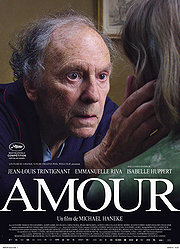 Georges (Jean-Louis Trintignant) and Anne (Emmanuelle Riva), a happily married husband and wife in their eighties, live together in a very nice apartment. Both of them are retired piano instructors and suffer from memory problems occasionally. When Anne suffers a stroke that paralyzes the right side of her body, she refuses to stay in the hospital and asks George to be her caretaker at home. He does everything his ability tend to her needs, both emotionally and physically, but soon daily chores become more and more of a hassle. It's no surprise then that he eventually hires nurses to take care of of Anne's physical needs, including washing her, and that the nurses don't treat Anne with respect and compassion. Georges and Anne's love for one another is truly put to the test as her condition gradually deteriorates. Writer/director Michael Haneke has created a profoundly moving romantic drama that's unflinchingly honest and tender. He focuses on the minute details of Georges and Anne's daily lives which may, at first, seem slight and even somewhat tedious, but the more immersed you are in their lives, the more you learn about them as human beings. To say that not much happens in Amour would be a very shallow critique because a lot happens beneath the surface. Haneke doesn't resort to flashbacks to explain Georges and Anne's background and how they met when they were younger. Their true love for one another is something that can be sensed through how they interact with each other and, most importantly, through Jean-Louis Trintignant and Emmanuelle Riva's brave, raw, heartfelt performances. It must have taken Trintignant and Riva a while to shake off their roles because they sink their teeth into their characters with so much emotional conviction and honesty. At times, it's emotionally draining to watch them as Amour sink deeper and deeper into tragedy. Amour could have easily been a two-character play given that it primarily takes place within the apartment of George and Anne. Their cold-as-ice daughter, Eva (Isabelle Huppert) and their former student, Alexandre (Alexandre Tharaud), a pianist, have ephemeral visits to their apartment. The film's staginess is barely felt because you're so emotionally captivated by what transpires to George and Anne; you feel as though you're there with them. Haneke also provokes you intellectually through the use of symbolisms, i.e. a pigeon that flying through the window not once, but twice. Anne's heart attack can represent any kind of physically traumatic experience that causes many changes within a marriage. One thing is for sure, though: George and Anne's love for one another never changed even through times of adversity. So, despite that Amour goes into dark, downbeat territory more often than not, as many great films do, it does offer a glimmer of hope about the everlasting power of true love through its vicissitudes. 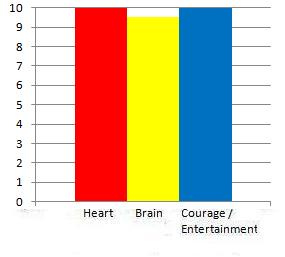  Beyond the Hills (directed by Cristian Mungiu) takes place in an isolated Romanian Orthodox monastery where Alina (Cristina Flutur) returns to her orphanage after spending a while in Germany. There, she reunites with her childhood friend Voichita (Cosmina Stratan) and hopes that she will run away with her from the monastery. Voichita refuses to run away because the monaster's Father (Valeriu Andriuta) will not welcome her back if she were to leave. Alina develops a fever and, quite subtly, expresses her sexual attraction toward Voichita, who resists her. The consequences of Alina's actions won't be spoiled here, but it's worth mentioning that writer/director Mungiu builds tension gradually and even veers the plot into psychological horror territory. Much like 4 Months, 3 Weeks, 2 Days, the pacing moves quite slowly, allowing you to absorb the scenes more fully; never is the film boring, though. It's also safe to say that it has ones of the most clever, funny and surprising endings in recent memory. Sundance Selects releases Beyond the Hills, release date TBA. Holy Motors 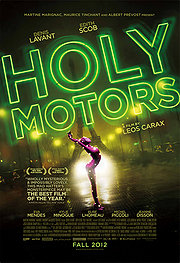 Bizarre, beautiful, ugly, unpredictable, creepy, perverse, funny, magical, exhilarating, slick, mesmerizing and allegorical are more than a handful of ways to describe Holy Motors. Monsieur Oscar (Denis Lavant) enters a stretch limo to start his work day that involves changing into a variety of different roles, i.e. an assassin, businessman, father and beggar. Céline (Édith Scob), his chauffeur, hands him a folder that informs him of what role he should transform into. The inside of that limo serves as a dressing room where he stick on and removes fake skin for his next role. What's the significance of his line of work? What does film say about modern times and identity? Fortunately, writer/director Léos Carax leaves those questions unanswered explicitly so that you, as an intelligent, perceptive member of the audience, can come up with your own answers. If this were a Hollywood film, you'd find a lot of exposition and everything would be spoon-fed to you; Carax resorts to virtually no exposition. At first, the transformations of Oscar feel slightly exhausting and they almost veer into pretension as he constantly goes back and forth between the limo and his new role. You'll feel as though you're going through a roller coaster ride of emotions from one minute to the next. The more you observe Oscar and ponder the implications regarding the film's social commentaries, the more fascinating and wondrous the film becomes. Denis Lavant delivers a tour de force performance--or performances, rather--that will haunt you with its sheer rawness. Rarely has an actor displayed versatility so deftly in one entire film. It probably takes a highly skilled actor to be able to shake off a role and transform instantly to another one so believable. He's simply mesmerizing from start to finish. Bravo to Carax for writing such bold, provocative and refreshingly original film that demands multiple viewings. Sure, many of the visuals are stunning and breathtaking to behold on the big screen, but style isn't all that Holy Motors offers: it also has plenty of substance to boot. It's quite a powerful statement about how modern times and, particularly, the advancement of technology, has affected our own identities. Technology has advanced, but do you truly think that human beings are advancing along with it? Technology complicates our relationships, sometimes chaotically, and coldly alienates us in many ways that make us forget about how to treat other human beings with respect and compassion. Paradoxically, within all of that chaos and alienation lies coherence, order and, yes, even a little warmth and humanity even if they're fleeting. 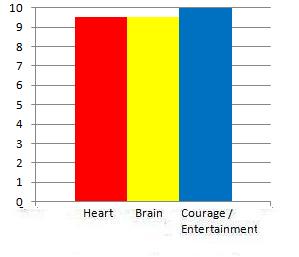 Leviathan  Bold, ugly, beautiful, haunting, nauseating, pretentious, scary, tedious and disgusting. Can a documentary be all of those descriptions concurrently? After watching Leviathan, the answer is a resounding "yes." The doc follows a fishing vessel as its crew members catch a variety of fish and gut then them. This is the kind of film that if it doesn't hook you, no pun intended, within the first 30 minutes, you'll be bored and/or annoyed by it for the remaining hour. The sights and sounds that you see and hear are at first are very hard to discern because of there's a lot of darkness and shaky camerawork, so you'll be confused about where you are and what you're seeing/hearing. Once you figure those basic questions out, you'll breathe a small, ephemeral sigh of relief. Co-directors Lucien Castaing-Taylor and Verena Paravel offer you no narration, context or even interviews thereby putting a lot of the burden on you to interpret the meanings of what you see and hear on your own. They make you feel as though you're right there on the fishing vessel. Eventually, it becomes much like a horror film because the directors put you right along with the gutted fish carcasses--blood, guts and all. Those images alone need no explanation because, like the entire film itself, they hit you on a visceral level. As the saying goes, images speak louder than words. Prepare to feel sea-sick at first and then sick to your stomach by the disgusting practices of the commercial fishing industry. If you have a strong stomach and can make it through to the end of Leviathan, you might find yourself speechless as you try to absorb everything you just saw. At a running time of 1 hour and 27 minutes, Leviathan is one of the most viscerally horrifying films in years. 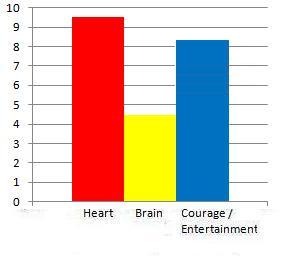
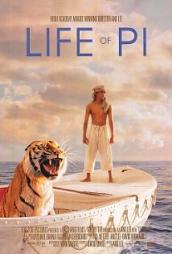 In Life of Pi (directed by Ang Lee), the Opening Night film, a young Indian boy, Pi (Suraj Sharma), miraculously survives a shipwreck aboard a lifeboat for 27 days. While fighting the elements, he learns how to get along with a Bengal tiger that ended up on the boat. There's no denying that the film boasts impeccable production values given the breathtaking cinematography, CGI effects and a terrific musical score. Its spiritual messages, though, become a bit heavy-handed, simplistic and preachy as it progresses. On top of that, Lee awkwardly flashes forward every now and then to the present-day scenes with Irrfan Khan playing the adult version of Pi as he tells his survival story to a writer (Rafe Spall), looks. Rafe Spall gives a very wood performance, and the transitions between past and present scenes are too abrupt thereby taking you out of the film's narative momentum. Overall, Life of Pi has plenty of style with some awe-inspiring moments but it ultimately leaves you dry-eyed. 20th Century Fox releases Life of Pi on November 21st, 2012.  The award for the most hilarious, bizarre and provocative documentary of the week goes to Room 237, directed by Rodney Ascher. If you think you've grasped the meaning of The Shining by watching it a number of times, think again. Can The Shining be truly about the Holocaust? The genocide of Native Americans? Or perhaps Kubrick was trying to confess that he faked the moon landing, according to another theorist? Are these fanatics of The Shining merely spewing conspiracy theories or conspiracy facts? Are the theorists insane or brilliant? Those answers are left up to you as the intelligent, critically-thinking viewer, but there are some arguments to be made for both sides of the coin. After all, there's always a fine line between genius and madness. Watching this doc is like going down a rabbit hole. Each theorist explains their theories and backs them up with their own logic via examples directly from the film that which will baffle and perplex you more often than not. Are they reading too much into the film or was Kubrick brilliant enough to leave those theories encoded so elaborately within the film? Either way, the result is the same: by the end of Room 237, you'll never look at The Shining the same way again, and you'll want to watch it forward, backards and forwards-and-backwards simultaneously. Sundance Selects opens the doc March 29th, 2013 at the IFC Center and Elinor Bunin Munroe Film Center. Something in the Air  In 1941 Paris, highschoolers Gilles (Clément Métayer) and his girlfriend, Christine (Lola Créton), and their friends join a student movement as revolutionaries who lash out against authority, including police, who stand in their way of free speech. When a violent uprising results in an injured security guard at school, Gilles, Christine and Alain (Félix Armand) flee to Italy. Their lives change innately there as they explore drugs and sex. Alain meets an American named Leslie (India Salvor Menuez) with whom he has a sexually-charged relationship. What starts as a provocative, suspenseful thriller turns into a quiet, emotionally resonating drama that tenderly explores the fragility, awakenings and curiosities of youth. Writer/director Olivier Assayas captures those moments with sensitivity and keen eye for period detail and atmosphere. Clément Métayer, Lola Créton, Félix Armand and India Salvor Menuez are each well-cast, sexy, charismatic and, most importantly, look and behave believably like youths from the 1970s. Créton absolutely sizzles in her role just like she did in Goodbye First Love. Everything from the set design, music and costumes also help to give the film an authentic evocation of that time period. Assayas should also be commended for displaying the youths' sexuality (or more accurately, sensuality) with frankness and honesty, i.e. not shying away from showing nudity thereby heightening the realism; if this were an American film, the actors'/actresses' bodies would be "conveniently" covered with a blanket even when they get up from their bed. Admittedly, the script doesn’t go profoundly into the minds of its protagonists nor does it offer many insights, but the strong performances come to the rescue because they make up for the deficiencies in depth—in fact, the performance add depth. Once the youths arrive at Italy, Something in the Air does lose a little bit of dramatic momentum and narrative focus, but not enough to prevent you from being captivated. 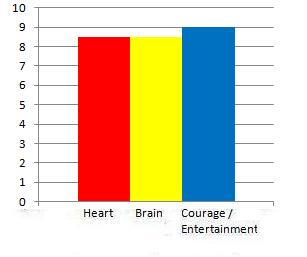 Tabu  In modern-day Lisbon, an elderly woman, Aurora (Laura Soveral), suffers from dementia as well as an addiction to gambling. She occasionally accuses her taciturn maid, Santa (Isabel Cardoso), of witchcraf. Her neighbor, Pilar (Teresa Madruga), seems to be the only person who can be considered a friend. Pilar attends U.N. protests and rejects the flirtations of a painter, Mario (Manuel Mesquita). When Aurora ends up in the hospital, she calls for Pilar to have her locate and contact her old flame, Gian Luca Ventura (Henrique Espirito Santo), whom she hasn't seen for many years. Gian Luca tells Pilar and Santa the story of how he had met Aurora. Fifty years earlier, Aurora (now played by Ana Moreira), lived on an ostrich farm located at the foothill of Mount Tabu in Africa with her husband (Ivo Muller). She had a steamy love affair with Gian Luca (now played by Carloto Cotta). Writer/director Miguel Gomes and co-writer Mariana Ricardo have woven a very sophisticated, lyrical and quietly drama that consists of two chapters. The first, titled "A Lost Paradise," takes place in Lisbon; the second chapter, called "Paradise," takes place in Africa. Gomes and Ricardo should be commended for taking narrative and aesthetic risks because, first and foremost, Tabu is filmed in black-and-white. Secondly, the second chapter is essentially silent; its only spoken words are those of the narrator. Both chapters feel absorbing and provocative, but it's the second chapter that finds just the right balance between provoking you intellectually as well as emotionally. The filmmakers also take risks by trusting that your intelligence and leaving a lot for your own interpretation. It's a testament to their impeccable skills at storytelling and filmmaking that they avoid turning Tabu into an exhausting film. Many of the scenes move as a leisurely pace which helps you to relax, to give you time to immerse yourself in the gorgeous visuals, and to ponder the film's many subtleties and nuances. Patient and intelligent audience members will be the most rewarded by watching Tabu. 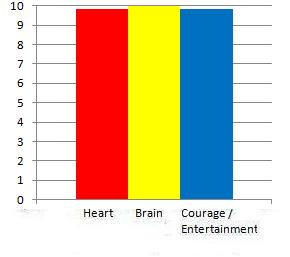 ______________________________________________________ |
The NYC Movie Guru
themovieguru101@yahoo.com
Privacy Policy